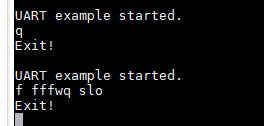Hi DevZone,
I am developing an application that needs to use UART communication with the nRF52840 pca10056 board.
I am using Segger Embedded Studio V4.16
I checked out the UART example found in the SDK files under \examples\peripheral\uart\pca10056\blank\ses\
I have setup my terminal program PuTTY with 115200 Baudrate, 8 Data bits, 1 Stop bit, No Parity and No Flow Control.
The example compiles fine, but does not run. I get no echo in the terminal as expected.
When i build and debug, I immediately end up in the app_error_weak.c file at line 100 - NRF_BREAKPOINT_COND;
Are there any know issues with this example? I have searched the DevZone and did not find any related posts.
I hope you can point me in the right direction.
Br. Casper



